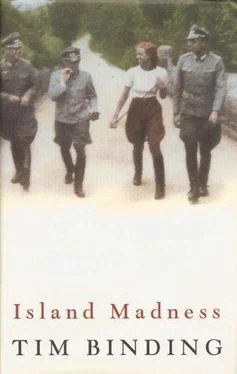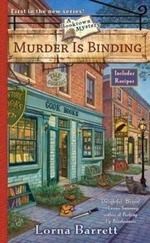“Even Athens had such places,” he reasoned. “For every Parthenon there is a charnel house and someone to stoke the furnace; for every poet a slave, for every philosopher a captive whore.”
“Is that what your plans are?” Ned asked. “To turn us all into whores and slaves?”
“We are all whores and slaves here, singing for one supper or another, doing as others bid us for want of courage, in the name of greed or expediency. For myself, I do not wish to see Guernsey change at all, though there are others stationed here with different plans. Help me with this and they may not have their chance.”
As they drove past Saumarez Park they came up against a column of Todt workers on their way to work, about thirty of them, boys and old men mostly, shuffling along, feet bare or wrapped in torn rags, hunched against the morning cold, each one carrying a tin bowl in their shackled hands. A Todt official marched alongside them, exhorting them to sing and to piek their feet up.
The group split in two and shuffled past. As he looked out through the windscreen Ned caught sight of a young boy, dressed in a dusty jacket and a pair of red pantaloons. With his dark eyes and his lips blue with cold, he looked more like a lost clown than a conscripted labourer. Where on earth had he got that outfit from? he wondered. Suddenly the boy jumped up on to the bank scrabbling about in the grass. Two others followed. The Todt official, puiling at his belt, sprang forward and began to beat them apart with a home-made whip fashioned out of a stick and four strands of leather. As they clambered back down Ned could see the boy had the best part of a dead rabbit in his hand. He held it triumphantly in the air before sinking his teeth into it. Ned could feel his stomach turn. The boy raised his head and looked into his face. There was no expression. Ned looked to the floor. Lentsch stared straight ahead.
“Animals,” they heard Wedel mutter. The column moved on, out of sight.
You could barely see it from the surface, though there were plenty of clues to tell you that there were more than moles working away under the soil: the endless supply of trucks moving along the connecting roads, the brute mouths waiting in the woods to swallow you up, the bare-bricked ventilating shafts set in the middle of vacant fields. If you put your head down one of those dark, plummeting holes you could hear the sound of hard-pressed men shouting and grunting behind the grind and clank of wheels, sniff the dank smell of oil and earth and, yes, the wet slippery scent of fear rising out. Then you would might know that beneath the buttercups and tufts of couch grass lay the largest and most complex structure existing in the whole of the Channel Islands. Ah, the solid rock of Guernsey.
He found that by lying on his back and pressing his feet against the roof of the tunnel he could push the cart along the rails like the old man had suggested. The old man had lived on the canals, and in the early days, when they’d had the will to talk, he had told him of his years working on the coal barges, crisscrossing Europe and the long low tunnels that ran through his working life.
“Me and the wife would lie on the barge roof and walk ‘em through,” the bargee had recalled. “No matter what the weight. Longer than the night itself some of them tunnels. We’d take a rest halfway and lie there in the pitch dark, not a sound around us, except the water dripping and the craft nudging one another. Maybe the splash of a rat somewhere.” He’d poked him in the ribs. “It’s where all our sprats got started. Didn’t matter how dark it was. We knew what we was looking for.”
Walking the wagons was tough on his legs, but it saved his arms for the shovel work at the end. Cement and brick going in, granite going out. Of the two operations, pushing the wagons out was the more dangerous, for the track sloped down towards the entrance and unless checked the wagons could piek up a dangerous momen-tum of their own. Crushed legs, crushed hands, broken ribs, a punctured gut—the wagons had taken their toll. A hospital, that’s what they were building, a hospital with kitchens and laundries and everything, even a cinema, though at the moment it was just rock and soil and the reverberation of a hundred hammers. Two long corridors they had hacked away, and in between, connecting them, a series of long domed rooms looking more like catacombs in a cathedral, where stone plinths covering the crumbling bones of ancient saints should reside, than dormitories built to raise the wounded from their beds. Not that he would ever lie on one of them. There was only one sickbed waiting for him. Collapsed from exhaustion? Sling him in the back of the truck. Back broken by a fallen roof? Sling him in the back of the truck. Blinded by blast fragments, coughing up too much blood, arm wrenched out of its socket? Sling him in the truck. And if he survived the day? Put him on the boat to that other island from where no one returned. They would die here, he knew it, wither and die and be chucked away, tipped out over the cliffs like so much rubble.
He had been working the tunnels for three months now in numbing twelve-hour shifts, twelve hours on, twelve hours off. Up at first light, a hard tear of bread, a bowl of cloudy water speckled with torn cabbage leaves and unwashed potato peelings, perhaps a strip of dog in the bottom, and then out in the half dark, with the overseer alongside them, whipping the air with his little tin pipe, deformed merriment playing down the narrow streets, their uniform a mixed bag of rags, here a long nightshirt hanging down over a municipal trousers, there a string vest behind a railwayman’s jacket, baggy linen trousers and calico shirts and flat caps atop every one, appropriated headgear of the defunct Czech army.
It was cold and weary, marching along with the wind from the coast adding a final chili to their bones. He’d never seen the sea before he’d been sent here. Two years and he still hated the sight of it. Last summer one afternoon they’d been let loose on one of the long beaches past the harbour, but though the rest had run down to the water’s edge, jumping and splashing and pushing each other as if they were on holiday, he had stood on the shore, unable and unwilling to move. It scared him, the sea, so huge and cold and without remorse. Not like the river by his village, and the towpath where he’d gone fishing with his dad, the cows mooching up and down in the meadow behind them. They’d shot them all that second afternoon when the other soldiers came, the dogs, the pigs, the cows, shot the lot of them, casual and laughing, as if they were out for day’s fun at a distant country fair.
So here he marched, with the weight of the sweeping sky calling to a stilled life beyond, no not marched, but shufïled in a frozen shivering sleep, ragged arm to ragged shoulder, ragged shoulder to ragged arm, feet black and raw and wrapped in blood-hardened rags, with the road bright and shiny from the night and the distant sound of the great green water sucking at the island’s heart: up the hill, past houses and cottages and hidden lives which he could guess at all too well. Were these the whitewashed walls behind which he had once lived, this cracked smudged pane of glass the window looking into his own forgotten life? Was this the meadow, this the pond, this the deserted apple grove where once his family’s pigs broke ground? Was that creaking iron pump, so sturdy in its stone casement, the pump under which he pushed his dirty traant face, that the handle, that the gush of water washing away, what, his mother’s ire, his sister’s gibes, his father’s loud lament? As they reached the lip of the hill, and starled down into that deep valley, half running, half stumbling, clanking like a medieval siege machine with the tin cups and billycans hanging from their sides, it seemed to him that the closer they came to the great dark hole the lusher the valley grew, as if God Himself was taunting them, showing them all the green wonder of the world before bidding them to depart. Thick ferns rose up out of the wayside grass, buds of he knew not what had pushed their way through the dark soil, the lattice of bare branches now replaced by a canopy the colour of succulent evergreen. And then, as it appeared that the road was leading them ever deeper into this impenetrable fertility, came the clearing, a bare slice of burnt and flattened ground, announced by black-lettered noticeboards peppered with exclamation marks and protected by wire fencing twelve foot high. Waiting behind the opened double gates, in two long rows, stood the guards, bristling in their brushed uniforms, barking at them as they trotted past, towards the iron grille and the grinding lorries and the great maw of a mouth beyond, ready to swallow and chew and spit them out, digested.
Читать дальше












